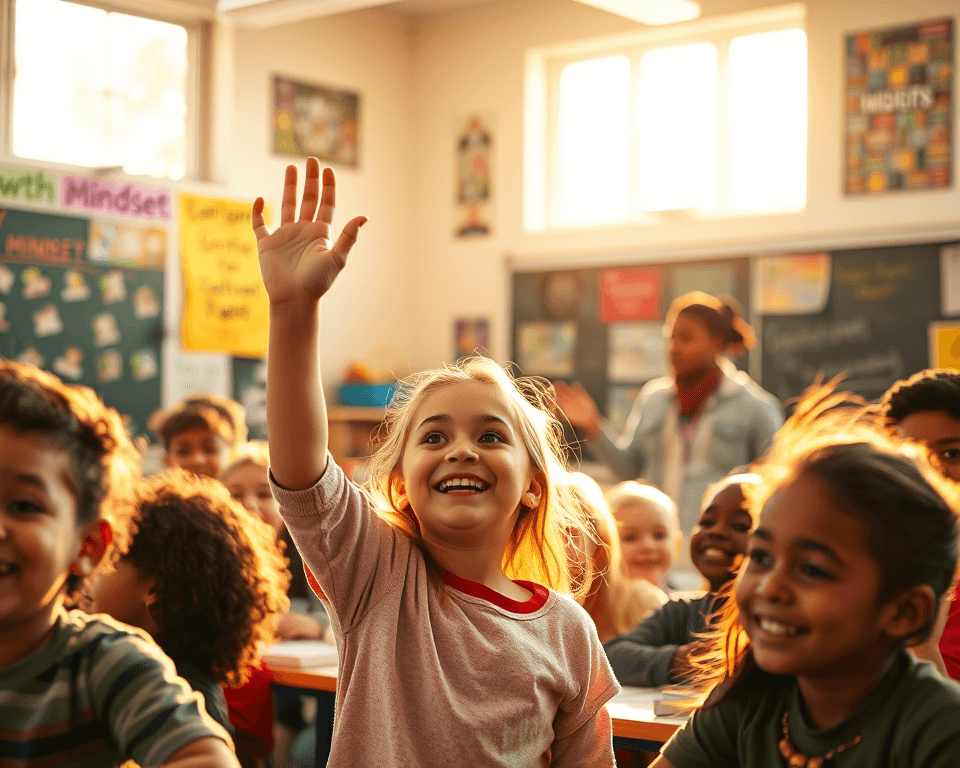Hey there! Let’s talk about something crucial: self-efficacy. You know, that inner belief that we can accomplish something? It’s what drives people (and students) to take on challenges, push through setbacks, and ultimately succeed. But honestly, many students struggle with this. If you’re an educator, a parent, or just someone who cares about empowering young minds, you’re in the right place! Today, we’re diving into some powerhouse ways to boost that confidence and set our students up for success.
Key Takeaways
- Understanding Self-Efficacy: It’s all about building that belief in abilities, which is foundational for motivation.
- Setting Achievable Goals: The magic of SMART goals helps students see progress, and that fuels their confidence.
- Building a Supportive Environment: A nurturing classroom can make all the difference in a student’s confidence and resilience.
- Collaborative Learning is Key: When students learn together, they build essential social skills and confidence.
- Involving Parents: Family support plays a huge role in fostering self-efficacy and helping students thrive.
Understand Self-Efficacy
What is Self-Efficacy?
So, what do we mean when we throw around the term “self-efficacy”? Basically, it’s the belief in one’s abilities to succeed in specific situations. Think of it as that little voice in your head that either pushes you to tackle a math problem or makes you freeze in fear when you see it. Psychologist Albert Bandura, who basically built the house of self-efficacy theory, tells us that this belief shapes our motivation, our behavior, and even our resilience. It’s a total game changer for academic success!
Here’s a fun fact: students who believe in their abilities tend to perform better in school. They’re the ones who take on challenges rather than shy away from them. How powerful is that? When students’ self-efficacy is high, it opens up a world of possibilities; their motivation soars!
Why Self-Efficacy Matters for Students
Let’s get real here. We all know how critical it is for students to perform well academically, but did you know that a strong sense of self-efficacy shapes their learning aspirations? It’s true! When students believe they can achieve, they’re more likely to take on difficult tasks, which leads to greater academic progress.
Here’s something to chew on: students with high self-efficacy are more likely to set robust learning goals. They engage more fully with their education, seeking help when needed and persisting in the face of challenges. They don’t just want to pass; they want to thrive!
“Confidence isn’t walking into a room thinking you’re better than everyone. It’s walking in and not having to compare yourself to anyone at all.”
Set Achievable Goals
How to Help Students Set Goals
Now, one of the key steps in boosting self-efficacy is helping students set achievable goals. But let’s not just throw random targets at them! It’s about being smart—yes, with SMART goals. This means making goals Specific, Measurable, Achievable, Relevant, and Time-bound.
For example, instead of saying, “I want to do better in math,” a SMART goal would be, “I will practice math problems for 30 minutes every day and will improve my score by 10% on my next quiz.” Bam! That’s actionable and encouraging.
Not only do these kinds of goals provide a clear roadmap for students, but they also serve as benchmarks for measuring progress. Seeing improvement reinforces that belief in their abilities, and suddenly, they’re not just wishing for success—they’re chasing it down!
Provide Constructive Feedback
The Role of Feedback in Building Confidence
Feedback can be tricky. We’ve all been there, right? Critiques can either deflate or inflate. It’s all about how we deliver it! Constructive feedback shows students that we’re in their corner and that we care about their growth. Instead of saying, “You failed this test,” let’s phrase it like, “That was tough, but you learned a lot of new concepts. Let’s look at what you can improve next time.” Just like that, we’re turning a failure into a growth opportunity!
Effective feedback highlights strengths and areas for improvement, but it’s also vital for helping students understand the why. This is where the magic happens. They start to connect the dots: If I work on this skill, I’ll do better next time. Suddenly, they’re motivated to tackle the next challenge, head-on, armed with the knowledge that they can do better.
“Mistakes are proof that you’re trying.”
Foster a Supportive Environment
How a Positive Environment Enhances Self-Efficacy
Alright, here’s a kicker: supportive environments are non-negotiable. Imagine stepping into a classroom where positivity radiates off the walls! A space where everyone feels safe to express themselves, make mistakes, and learn together. That’s where the magic happens.
When students feel supported by teachers and peers, they’re much more likely to take risks and push their limits. Building strong relationships in classrooms helps foster this environment. Students who trust their teachers feel comfortable speaking up, sharing ideas, and asking questions. This kind of emotional safety leads to greater confidence and ultimately enhances their self-efficacy.
Encourage Self-Reflection
Benefits of Self-Reflection on Learning
Next, let’s talk self-reflection. When was the last time you checked in with yourself about how things were going? Self-assessment isn’t just for adults; it’s crucial for our young learners too! We can help students take a step back and evaluate their strengths and weaknesses.
When they engage in self-reflection, they’re not just assessing their performance—they’re identifying areas for growth. This process is empowering! Students who regularly reflect on their learning experiences are better equipped to set new goals, stay motivated, and recognize their progress. And when they see how far they’ve come, their self-efficacy skyrockets!
Utilize Collaborative Learning Techniques
How Collaboration Builds Confidence
Now, let’s shift gears and talk about collaboration. There’s something powerful about students learning together. When they work in groups, they have the chance to interact, exchange ideas, and support one another. It’s like a confidence-building boot camp!
This collaboration not only enhances understanding of the material but also fosters essential social skills. Think about it: when students struggle with a concept, having a peer to lean on can make all the difference. Suddenly, challenges don’t seem so daunting. They’ve got backup!
Benefits of Collaborative Learning
- Boosts Confidence: Students feel less isolated and more supported.
- Enhances Social Skills: Learning how to work as a team prepares them for life beyond the classroom.
- Increases Engagement: Collaborative projects can bring a new energy to learning.
Provide Resources for Independent Learning
Encouraging Lifelong Learning Through Resources
Listen, independent learning is where the magic really happens. Teaching students to take initiative into their own hands not only builds self-efficacy but also makes them more engaged learners overall. Whether it’s through online platforms like Khan Academy or tools like Quizlet for studying, the resources are there!
Self-directed learning fosters autonomy and encourages them to explore topics they’re passionate about. There’s nothing better than seeing the light bulb go off when a student discovers something new on their own! It’s a boost not only for their knowledge but for their confidence as well.
Celebrate Achievements
The Impact of Celebrating Success on Motivation
Celebrating achievements—big or small—is huge! Acknowledging progress reinforces that positive behavior and encourages students to keep pushing forward. I mean, who doesn’t love a good celebration? When students receive recognition for their efforts, it creates a culture of positivity and motivation in the classroom.
Let’s be real—this doesn’t mean throwing a huge party every time someone answers a question correctly! It could be as simple as written notes of encouragement, shoutouts in front of the class, or a wall of fame for student achievements.
“Success is not the key to happiness. Happiness is the key to success. If you love what you are doing, you will be successful.”
Teach Resilience and Coping Skills
The Importance of Resilience in Student Success
Resilience—the ability to bounce back from setbacks—is like superhero power for our students. Life is going to hit them with challenges, and we want our students to be prepared to face those adversities with strength.
We can teach them coping mechanisms, like mindfulness strategies or creative outlets—whatever resonates with them. These skills are essential for dealing with stress and anxiety, and they play a huge role in maintaining a positive self-image and higher self-efficacy.
Involve Parents and Guardians
The Role of Family in Building Self-Efficacy
Last but certainly not least, let’s chat about parental involvement. This can’t be overstated! When parents and guardians actively support their kids’ education, it creates a solid foundation for confidence and success. Regular communication between teachers and parents can help reinforce the student’s belief in themselves.
Empower parents with tips to help their kids at home—like creating a dedicated study space or setting aside regular times for homework. When families are engaged and supportive, students feel more secure in their abilities, which directly feeds into their self-efficacy.
To wrap this up, it’s essential to foster self-efficacy in our students if we want to see them flourish. By understanding this concept and implementing actionable strategies, we’re giving them the tools they need to succeed, both academically and in life. With these ten proven ways, you’re now armed to build confidence and set students up for success one step at a time!
Frequently Asked Questions
How can I improve my child’s self-efficacy in learning?
To improve your child’s self-efficacy, encourage them to set achievable goals, provide constructive feedback, and foster a supportive environment. Engaging them in self-reflection and celebrating their achievements can also boost their confidence and motivation.
What are some practical goal-setting techniques for students?
Students can use the SMART criteria (Specific, Measurable, Achievable, Relevant, Time-bound) for effective goal setting. Breaking down larger goals into smaller, actionable steps can make them more manageable and improve focus and motivation.
How does positive feedback affect student performance?
Positive feedback reinforces good behavior and encourages students to continue improving. It highlights their strengths while addressing areas for growth, fostering a growth mindset that promotes resilience and a willingness to take on challenges.
What role do parents play in boosting student confidence?
Parents play a crucial role by providing emotional support, encouragement, and a conducive home learning environment. Active involvement in their child’s education, such as attending school events and communicating with teachers, strengthens self-efficacy and learning motivation.
Why is a supportive classroom environment important?
A supportive classroom environment fosters positive relationships among students and teachers, creating a sense of safety and belonging. This emotional safety enhances self-efficacy, enabling students to engage more fully in their learning and take academic risks.
What are effective ways to teach resilience to students?
Teaching resilience can be done through modeling coping mechanisms, helping students learn from failures, and encouraging a growth mindset. Activities that involve problem-solving and teamwork can also reinforce resilience and coping skills.
How can collaborative learning enhance student confidence?
Collaborative learning encourages interaction and peer support, which builds social skills and enhances confidence. Working together on projects allows students to share successes and learn from one another, reinforcing their belief in their abilities.
What resources can support independent learning for students?
Resources such as online educational platforms, library materials, and study guides can promote independent learning. Encourage students to explore these resources for self-directed studies, enhancing their learning autonomy and motivation.
Can celebrating small achievements really impact student motivation?
Yes, celebrating small achievements boosts motivation by reinforcing positive behavior and acknowledging progress. Recognizing these milestones fosters a sense of accomplishment and encourages students to strive for further success in their educational journey.
How does self-reflection improve student performance?
Self-reflection helps students assess their learning experiences and identify strengths and weaknesses. By understanding their progress and learning needs, they can adjust their strategies and set more effective goals, ultimately enhancing academic performance.










